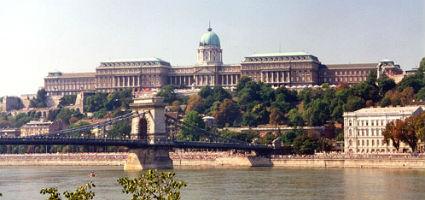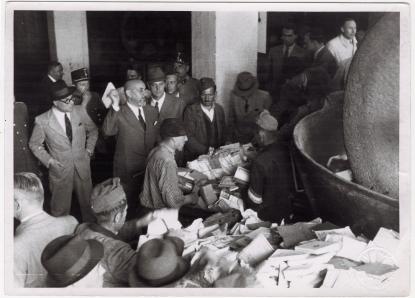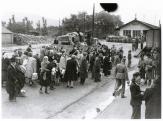 |
Address: 1014, Budapest Budavári Palota, F épület
Phone number: (1) 224-3742
E-mail: inform@oszk.hu
Opening hours: Tue-Sat 10-18
|
|
Group ticket
(over 10 people)
|
300 HUF
|
/ capita
|
|
Ticket for adults
|
1000 HUF
|
|
|
Ticket for students
|
500 HUF
|
|
|
Ticket for pensioners
|
500 HUF
|
In the framework of the Holocaust Memorial Year, an exhibition opens on 28 May 2014 at the National Library, which deals with the 1944 book prohibitions, book destructions, and the then head of the library's Manuscript Store, Gábor Halász' life's work and the fate.
Hungarian political elite before the war watched and feared Hitler as they expected from him to at least partly remedy the tragedy of Trianon. Three weeks after Austria had been attached to Germany, in April 1938 the Prime Minister Darányi submitted the for "the balance of social and economic life enforced in a more effective way" that is, the first anti-Jewish law. Following the proposal, a line of roughly insulting anti-Jewish laws and regulations on the equality of rights made second class citizens the Jews in Hungary. But despite all the deprivation and restrictive measures, the livelihood of the local Jews and those that fled to Hungary remained safe until March 19, 1944, compared to other countries under the influence or occupation by the Germans. Fulfilling German demands and with the unfortunately very effective assistance of the Hungarian government the complete separation of the Jews began, and then - as soon proven - did the deportations to the almost certain death.
It had devastating consequences for the whole Hungarian intellectual scene. After the occupation the despite the "gleichschaltising"of the Hungarian press and publishing that enjoyed unprecedented freedom despite of wartime censorship occurred almost immediately. Not only that, but especially the works of Jewish authors (of whom about two and a half thousand were"Jewish" art), as well as a number of newspapers and magazines were banned. In fact, following a German example, but by Hungarian initiative, volumes written by Jewish writers begun.
 The exhibition focuses on the latter, the symbolic destruction in detail understanding its immeasurably devastating result. The atmosphere of the era is recalled by way of carefully selected audiovisual documents, archival newsreels and personal memoirs. We direct attention on prohibitive measures against Jews that were taken in quick succession after the German occupation was born. First, we would like to recall the story of books by Jewish authors and also how József Fitz, then manager of the National Széchenyi Library attempted to save whatever he could. Not only books, but also his excellent colleague, one of the most talented essayist of his generation, the literary man whose skill of the Hungarian language was outstanding, Gábor Halász as well. That he could not save the life of Gábor Halász puts eternal shame the Hungarian elite of the time and Hungarian Administration who did not do anything out of fear, opportunism, or were even happy not to intervene. Even if without German pressure it would not have happened.
The exhibition focuses on the latter, the symbolic destruction in detail understanding its immeasurably devastating result. The atmosphere of the era is recalled by way of carefully selected audiovisual documents, archival newsreels and personal memoirs. We direct attention on prohibitive measures against Jews that were taken in quick succession after the German occupation was born. First, we would like to recall the story of books by Jewish authors and also how József Fitz, then manager of the National Széchenyi Library attempted to save whatever he could. Not only books, but also his excellent colleague, one of the most talented essayist of his generation, the literary man whose skill of the Hungarian language was outstanding, Gábor Halász as well. That he could not save the life of Gábor Halász puts eternal shame the Hungarian elite of the time and Hungarian Administration who did not do anything out of fear, opportunism, or were even happy not to intervene. Even if without German pressure it would not have happened.
But as much as it hurts, we know: it would not have happened without active assistance on the Hungarian side. History is irreversible. Unfortunately what did happen and is done can not be undone. We may examine a series of events or the outcome of it even events leading to it. Our exhibition about the "final outcome" in which the books, the thoughts were awaiting their fate, "trampled on". In their survival and rise the
librarian also played an important role.
every Thursday (May 29., June. 5. 12., 19., 26., July 3., 10.), guided tours are available at 15. 00, in connection with the educational course 'Our Century Final Battles by the Danube ' is held at 16. 00 (director: Péter Bokor: Gábor Hanák ) of the episodes we screen a film
with professionals introduction
Guided tours are available only for 6+ people therefore we ask you to give notice on the Monday before your intended visit at csoportvezetes@oszk.hu or phone 224–3742 from Monday to Thursday 9–16, on Friday 9–13.
Curator: Erika Nemeskéri, Gábor Hanák, associate curator: Ferenc Földes .
Visit to the exhibition, the guided tours are all free of charge.





